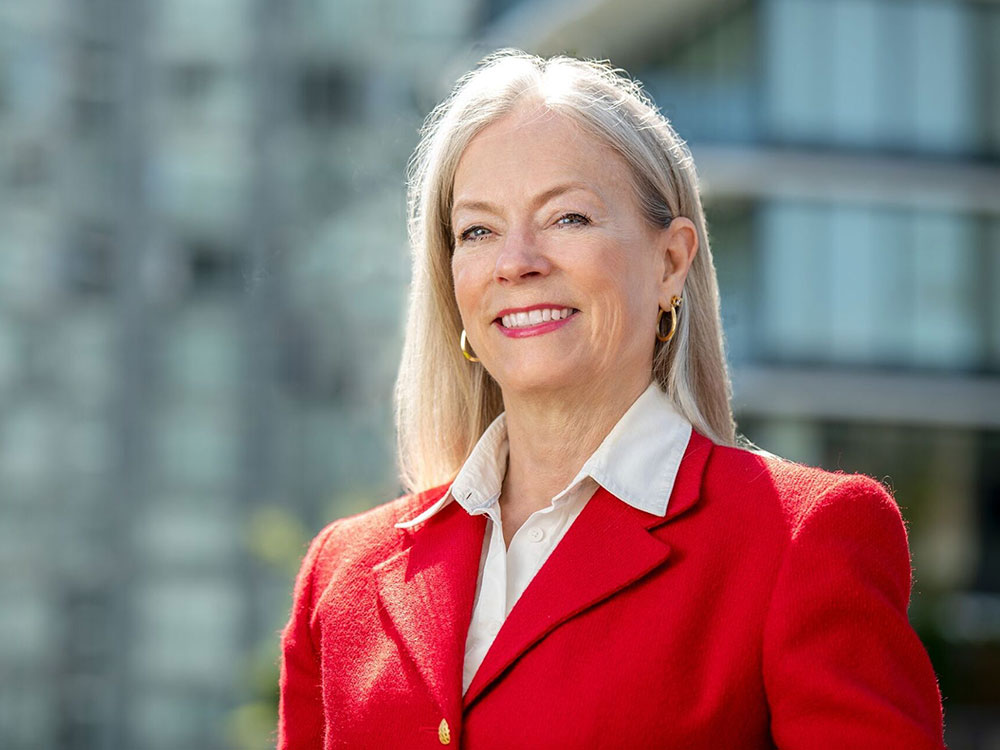In the midst of a Vancouver civic election where housing is a hot issue, Vancouver councillor and mayoral candidate Colleen Hardwick stated that “highrises are not good for people’s physical and mental health.”
Hardwick made the assertion during an interview with Tyee reporter Jen St. Denis, claiming “there’s been so much work done showing” what she said was correct.
What did Hardwick consider a highrise building? One “where you take elevators that go to floors and people stop interacting with one another.”
And what specific research could she point to in support of her views? Hardwick cited a Vancouver Foundation report from 2012.
Curious to know more, we started by reading that document. The "Connections and Engagement" report surveyed 3,841 people across Vancouver and aimed to measure connections and engagement on three levels: personal friendships, connections to neighbours and neighbourhood, and people’s relationships and attitudes towards the larger Metro Vancouver community. It’s not a peer reviewed academic study, but it provides some interesting perspectives on what the authors say are prevalent feelings of isolation and loneliness.
Nowhere in the report is there a specific reference to the effect of highrises on health. However, there is a section that notes people who live in apartments are less likely to chat with a neighbour and know their names than people who live in townhomes or single-detached homes.
Colin Ellard, a psychology professor at the University of Waterloo who investigates the psychology of residential design and restorative effects of natural settings, agrees that conventional highrises in their current form are not great for health.
“If you’re living in a highrise, there’s a separation or a boundary between your dwelling space and the outside world,” said Ellard, who’s written about how our homes, workplaces, cities and nature have influenced us throughout history in his book Places of the Heart: The Psychogeography of Everyday Life. “It’s especially difficult for children who are separated from nature.”
“Being in nature is good for us and I mean not just mentally but also physically.”
But Meg Holden, an urban studies professor and researcher at Simon Fraser University who was on the advisory committee for the 2012 Vancouver Foundation report, said Hardwick got it wrong.
“I understand why Coun. Hardwick could draw that conclusion from that research. But in fact, that’s exactly the opposite conclusion that the report drew,” she told The Tyee.
Holden said the survey’s goal was to investigate how to get people more engaged and to feel more of a sense of belonging to the city. The report found that some of the factors that lead people to feel less connected included being low income, being less educated, being in poor health or having poor health, she said.
Belonging can be fostered without barring a particular type of housing, Holden emphasized. “Because not everyone is fortunate enough to have a parent with a $4.4 million house in which they can live.”
Last week we asked Hardwick to expand further on her views about health and building types. She told The Tyee she believes highrises radically reduce chance encounters between people because they separate people from the street and from each other.
“Ground-oriented housing typologies are ideal,” she said, referring to housing that allows a resident to reach their place of residence using stairs, perhaps, but not an elevator. Such buildings can have many units. “The height and massing and composition of the building allows human interaction and sociability like you would have in anything from townhouses up to five or six storeys.”
“Coun. Hardwick is cherry-picking her data” about highrise living and the isolating effects of structures with elevators, accused urbanist and author Charles Montgomery. A six-storey building with an elevator, he told The Tyee, is “the most social place I’ve ever lived.”
Montgomery spent a decade studying well-being in cities and the effects of building form on social relationships and wrote the book Happy City: Transforming Our Lives Through Urban Design. His consulting firm’s past clients include Westbank Corp., a major developer of highrises in Vancouver and the region.
Christine Boyle, Hardwick’s fellow city councillor and OneCity representative, also disagrees with Hardwick’s statement about elevator buildings harming people’s well-being. “I have read that research [by the Vancouver Foundation] and didn’t see a reference to that specifically,” she said.
Boyle said that her party believes the city also has an important task to build community and tackle social isolation. But her larger concern with the housing crisis is the negative health impact of precarious or unstable housing or lack of housing.
Boyle says that the health impacts on seniors and children facing insecure housing are significant. Affordable, safe and secure housing is a basic human right that will help make the individual and the larger community healthier and safer, she argued.
Vancouver is home to over 660,000 people and faces a growing demand for adequate, affordable housing. The city’s current government has set a housing target of adding 72,000 homes by 2027.
A City of Vancouver report released in April found that some groups have been disproportionately impacted by the housing crisis. A large portion of low-income households facing housing insecurity include Indigenous and racialized households, renting seniors, lone-parent households, and people with accessibility needs.
Over 2,000 people are experiencing homelessness, according to a 2020 count by the city.
The average market rent or unit costs for newly built housing, whether in a highrise or not, are well beyond the means of the people the City of Vancouver report described.
In her time as a city councillor, Hardwick has voted against a number of new housing projects, and the Broadway Plan which would rezone a large swath of land along Broadway for denser, taller highrise housing. Hardwick is quick to point out she has voted yes to other housing projects, including a detox centre in East Vancouver and social housing developments.
When considering what’s needed to add density, Hardwick says, “We need to look at the character of the neighbourhoods and where the opportunities are to be adding density that is consistent with the neighbourhoods.”
Hardwick says she is a staunch supporter of “gentle density” which she defines as “adding density, without knocking down our existing buildings, because the most affordable buildings and the greenest buildings that we have, are the ones that already exist.”
What she is opposed to, she says, is adding more housing projects when there are well over 100,000 units in production.
“We’re producing housing for people who don’t live here,” she said. “Of what we’re building, three out of five of those units are being sold to investors, whether that’s global wealth, or domestic real estate investors, including domestic real estate investment trusts.”
“The city has had a vested interest in promoting large-scale development in the form of rezoning to extract revenue,” she said.
Boyle said that even as the city has grown, there are neighbourhoods in Vancouver that have been losing residents and seen shrinking numbers. “We need to build good mixed-income housing throughout all our neighbourhoods.”
“We’re seeing a nursing shortage; the school board has struggled to hire teachers. We hear regularly from small businesses struggling to hire staff to work in their businesses,” Boyle said. “It’s because there isn’t enough affordable housing across the city.”
She adds that there are huge benefits to welcoming more families and more neighbours back into the neighbourhood — for the neighbourhood and for struggling small businesses.
The Tyee also reached out to Vancouver mayoral incumbent Kennedy Stewart for comment on Hardwick’s argument on the correlation between highrises and health.
A statement from his recently created party said, “If we want to address housing affordability in Vancouver, we have to increase the supply and variety of housing available. That is why Forward Together has committed to approving and enabling 220,000 new homes over the next ten years — including 140,000 market rental, below-market rental, social housing and co-ops as well as 40,000 new ground-oriented homes and 40,000 new market condos or townhomes. This will give Vancouverites more options and allow them to choose the housing type that is right for them.”
Are there ways to improve the experience of tower living?
Ellard is a proponent of well-distributed common areas throughout the building and access to green spaces, an approach that’s been embraced by architects and urban designers in Holland and Sweden.
Montgomery’s research has led him to realize that the strongest design-related effects on social trust are not related to building aesthetics but to one’s commute. People forced to commute long distances express lower trust in neighbours and have fewer friends and community connections, he said.
“This has led me to be more in favour of denser multi-family housing in urban centres,” he said.
It’s also illegal to construct apartment buildings on 70 per cent of the city’s residential land, Montgomery said, a legacy of racist and classist urban planning from the last century. “It’s unfair, unhealthy, unsustainable and it’s wrong. We have to stop it.” ![]()
Read more: Municipal Elections 2022, Housing, Municipal Politics, Urban Planning

















Tyee Commenting Guidelines
Comments that violate guidelines risk being deleted, and violations may result in a temporary or permanent user ban. Maintain the spirit of good conversation to stay in the discussion.
*Please note The Tyee is not a forum for spreading misinformation about COVID-19, denying its existence or minimizing its risk to public health.
Do:
Do not: